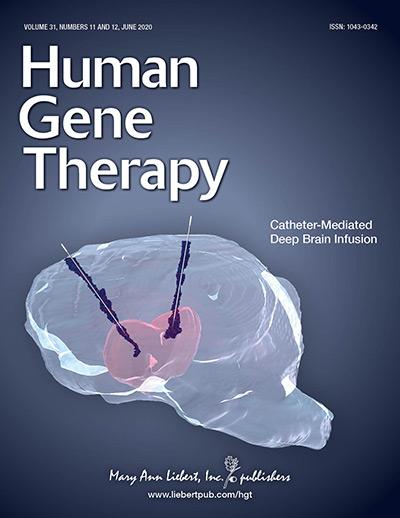
Credit: Mary Ann Liebert, Inc., publishers
New Rochelle, NY, July 2, 2020–The Editor-in-Chief of Human Gene Therapy, the first journal devoted to the field of gene therapy, and one of the world’s leading experts on gene therapy have co-authored a new editorial, Moving Forward After Two Deaths in a Gene Therapy Trial of Myotubular Myopathy, in response to the news of two deaths in a now-halted gene therapy clinical trial.
The editorial, published in Human Gene Therapy, is co-authored by James M. Wilson, MD, PhD, director of the Gene Therapy Program at the University of Pennsylvania and former Editor Human Gene Therapy Clinical Development, and Editor-in-Chief Terry Flotte, MD, who is also the Dean of the University of Massachusetts School of Medicine.
The editorial is in response to the recent report of the deaths of two children receiving high doses of a gene therapy vector (AAV8) in a Phase I trial for X-linked myotubular myopathy (MTM). The news “is a tragic reminder of how difficult it is to predict outcomes in first-in-human studies,” the authors wrote.
The sponsor of this clinical study is Audentes Therapeutics, which was acquired by Japan’s Astellas Pharma in 2019. Wilson and Flotte say preclinical studies had been very promising. But in the ongoing trial, three patients were given a three-fold higher dose than other participants; they all experienced severe hepatotoxicity, which proved fatal in two of these subjects.
Wilson and Flotte note that some signs of toxicity have been reported in other AAV trials over the past year or two, including trials for spinal muscular atrophy and Duchenne muscular dystrophy, which are being run by companies such as Solid Bio, Sarepta, and Pfizer. Fortunately, all the affected subjects in these trials have recovered.
In early 2018, Wilson published a landmark paper in Human Gene Therapy describing severe toxicity in nonhuman primates infused with high doses of AAV.
Although data are limited at present, Wilson and Flotte suggest the deaths of the MTM trial “more closely resembles those of the [non-human primate] studies rather than those of the [Duchenne] trials.” One possibility the authors discuss is the role of antibodies to AAV that either pre-exist or accumulate following vector infusion.
With much more work needed to understand immune-mediated gene therapy vector toxicities, Wilson and Flotte conclude that “the early clinical development of gene therapy vectors may require an iterative process, especially if unexpected toxicities are observed.” Additional studies in preclinical models should help evaluate the variables associated with immune response.
The MTM trial is on hold while authorities investigate further; the fate of the candidate therapy is unclear.
“Whether this product can be revived is unclear, the fact remains that patients with MTM and many other rare genetic diseases have no treatments,” the authors state. “It is imperative that the scientific community work together with full transparency and cooperation to learn from these tragedies to assure that we can deliver safe and effective treatments to individuals living with rare genetic diseases such as MTM.”
###
Editor’s Note: Dr. Wilson and the Penn Gene Therapy Program previously participated in a collaborative sponsored research project (since expired) with Audentes for development of an AAV gene therapy for a different disease indication. Astellas/Audentes has sublicensed rights from REGENXBIO to certain Penn-owned patents on which Dr. Wilson is an inventor that cover certain recombinant AAV constructs including AAV8.
About the Journal
Human Gene Therapy, the Official Journal of the European Society of Gene and Cell Therapy and eight other international gene therapy societies, was the first peer-reviewed journal in the field and provides all-inclusive access to the critical pillars of human gene therapy: research, methods, and clinical applications. The Journal is led by Editor-in-Chief Terence R. Flotte, MD, Celia and Isaac Haidak Professor of Medical Education and Dean, Provost, and Executive Deputy Chancellor, University of Massachusetts Medical School, and an esteemed international editorial board. Human Gene Therapy is available in print and online. Complete tables of contents and a sample issue are available on the Human Gene Therapy website.
About the Publisher
Mary Ann Liebert, Inc., publishers is known for establishing authoritative peer-reviewed journals in many promising areas of science and biomedical research. Its biotechnology trade magazine, GEN (Genetic Engineering & Biotechnology News), was the first in its field and is today the industry’s most widely read publication worldwide. A complete list of the firm’s 90 journals, books, and newsmagazines is available on the Mary Ann Liebert, Inc., publishers website.
Media Contact
Kathryn Ryan
[email protected]
Original Source
https:/
Related Journal Article
http://dx.




